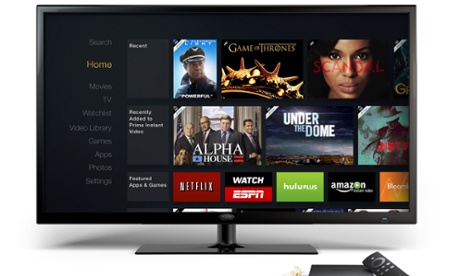
RIP television? Long live video? Well, not quite yet.
That was the hidden message behind Amazon's launch of its long-expected TV set-top box this morning, which arrives at a time when the entire idea of television is up for grabs. As long as Big Content and Big Telecom exist in their current forms, it will be difficult for fans of video – and who isn't one? – to get what they really want: the freedom to watch and discover moving pictures where, how and whenever they choose.
But Big Content and Big Telecom, as we know, move glacially.
Until they melt, Amazon Fire TV is a step forward. Although I must say, even as a (tiny) shareholder, I don't see a compelling reason for anyone with a competing device – an Apple TV, a Google Chromecast, a Roku box – to buy it if they're satisfied with what's already in their living room. At $99 it's the same list price as Apple TV, three times the price of the Chromecast, and twice as expensive as a Roku.
I do see three notable aspects to the Fire TV that go beyond beyond the ubiquitous, Apple-era emphasis on ease-of-use and provide a window into the living room of the future.
First, it does TV voice search. You talk into the Fire remote and it searches what you're looking for, something the devices from Roku, Google and Apple can't match today. Sony is promising it soon, and it's available already from Microsoft customers who use their new Xboxes to watch TV – and I can't imagine big-screen Siri is far off. Soon we'll be screaming at the walls, and the walls will have eyes.
Amazon is first into TV voice search. You talk into the Fire remote and it searches what you're looking for, something the devices from Roku Google and Apple can't match today. Though I can't imagine big-screen Siri is far off. Soon we'll be screaming at the walls, and the walls will have eyes.
Then there are the 2gb of storage, which competitors should be able to match quickly but which should produce better performance once a significant part of any given movie or show has been stored temporarily in your "local" memory. None of which fixes the stranglehold Internet service providers have on provision of data service in the first place, nor the way they are trying to extract extra money from companies that offer video streaming. To the extent that Prime Video gets popular, Amazon will soon be facing this extortionate practice itself.
And then there's gaming, which derives from the new device's software heritage: the Android operating system, which, as in the Kindle Fire e-reader, Amazon has tweaked beyond recognition from Google's freely available operating system. The Fire TV represents zero threat to the super-powerful game consoles from Microsoft, Sony and Nintendo, or to dedicated PC games, but it will be good enough for people who just want to have a bit of fun from time to time.
Careful, though: when Amazon claims the Fire TV is part of an "open ecosystem" because it uses a heavily doctored version of Android, don't be fooled that it's necessarily on your side of a video free-for-all future. Amazon is one of the kings of the lockdown media world, dominated by the copyright paranoia of Hollywood and publishers, and platform providers' desire to create customer lock-in. Want to read that Kindle book on an unauthorized device? Nope. Want to watch Amazon Prime videos on an unauthorized device? Nope again.
Despite all the dribs and drabs of innovation in the ocean of old-media rules, we're beginning to see a kind of ideal on the horizon. To get the real thing, you have to imagine a world where Big Content and Big Telecom simply no longer control so much.
You wouldn't be searching inside the apps of platform providers. You'd just search whatever you wanted to see or do, and you'd get a list of everyone offering it, along with a price. (The future, alas, is not free, and the Pirate Bay will always be limited.)
TV streaming and buying would be entirely à la carte. Gone would be the system of semi-competition, of backroom bundles that force you to pay for channels and programming you wouldn't watch – even if it was the only thing available, like when you turn off the TV after a long, fruitless Netflix scroll.
In the ideal couch-potato future, our TV sets would just become one more screen, part of a home entertainment and data management system that you control from other devices and locations.
You can bet that Apple has this vision squarely in mind. But given Apple's own history, you have to wonder if the company's designs are as much about its own lock-in goals as they are about serving customers.
That's why all the talk of an Apple partnership with Comcast is so scary. Here are two of the most control-freakish companies on the planet, enormously powerful and wealthy, working on systems that could not possibly be good in the long run for the truly open ecosystem that we so desperately want and need.
Perhaps the best we can hope for, in the short and medium term, are incremental improvements and competition from huge enterprises and industries, preventing each other from absolute control. In the long run, that won't be nearly good enough, not if technology users and media audiences – you and me – want to be able to do things our own way.

